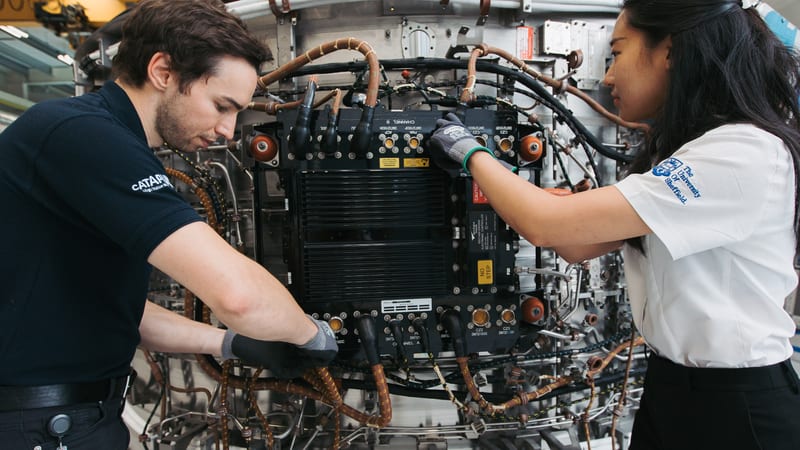True North: Northern Star — Samuel Remi-Akinwale

Samuel Remi-Akinwale is the CEO of Young Manchester, a youth-led partnership organisation that champions opportunities for young people across the city.
Read more
We make the difference. Talk to us: 0333 004 4488 | hello@brabners.com
4 min read

The University of Sheffield Advanced Manufacturing Research Centre (AMRC) focuses on driving digitalisation, sustainability and skills development in both local economies and the broader UK manufacturing landscape.
As part of our True North report, we celebrate our 'Northern Stars' — selected organisations that we highlight as having the right approach to addressing core challenges. Here we take a look at the AMRC.
Founded in 2001 as a collaborative venture between the University of Sheffield and Boeing, the AMRC emerged with a distinct vision: to bridge the gap between cutting-edge academic research and the practical needs of manufacturing companies.
Over the years, this vision has transformed into reality, making the AMRC a global leader in manufacturing excellence — building on Sheffield’s history as the ‘Steel City’, while leveraging emerging technologies and academic excellence to take its past success into a new era.
The mission of the AMRC — which is part of the national High Value Manufacturing Catapult network — is to transform lives through innovation, improving local people’s life chances and the regional economies in its main locations of South Yorkshire, Lancashire and North Wales. Yet its influence extends far beyond, as a national asset, working with 1,100 companies each year, across the country and around the world.
With a network encompassing 70 universities and over 1,000 companies, ranging from start-ups to industry giants — including Airbus, Boeing, and Rolls-Royce — the AMRC translates research into practical solutions that enhance productivity and efficiency. With a team of more than 500 highly-skilled researchers and engineers, it tackles diverse challenges from composites to castings, digital and data to additive manufacturing and machining.
The centre operates within six core strategies: digital transformation, future propulsion, impact, supply chain resilience, sustainable manufacturing, and training and skills. This multifaceted approach enables the centre to address a diverse array of challenges facing the manufacturing industry.
The AMRC’s unique approach to innovation involves tailoring solutions to each company’s needs, mitigating the risks associated with implementing novel technologies or new processes. This commitment to de-risking innovation has led to substantial advancements across the manufacturing sector, yielding benefits such as increased speed, reduced costs, enhanced safety, less waste and heightened sustainability.
Behind some of the biggest private sector investments in UK advanced manufacturing over the past 15 years, the AMRC has helped to bring more than £260m and 600 jobs to South Yorkshire and has turned £5m of EU funding into £22.5m of value for SMEs in Lancashire. It has also trained more than 1,700 apprentices — 80% from South Yorkshire and many from the most deprived postcodes — for fulfilling careers in advanced manufacturing.
The AMRC is at the heart of the South Yorkshire Advanced Manufacturing Innovation District and alongside the announcement that South Yorkshire would be home to the UK’s first investment zone, it recently launched Composites at Speed and Scale (COMPASS). This £80m funding boost and innovation facility in partnership with Boeing, Spirit Aerosystems and Loop Technology will place the UK in a world-leading position to make the global aviation industry more sustainable.
Employing leading graduates coming out of not just the University of Sheffield, but academic institutions across the country — as well as the most talented young people from schools in the local area to take up its apprenticeships – the AMRC offers a unique experience. It gives its people the opportunity to work with hundreds of technologies across multiple disciplines. It’s a hub of talent, an organisation trading on know-how and predicated on the idea that technology can take ideas and innovation to production and development.

Samuel Remi-Akinwale is the CEO of Young Manchester, a youth-led partnership organisation that champions opportunities for young people across the city.
Read more

We explain the impact of the cyber-attack on JLR's workforce and outline what to do to protect your business and minimise the impact if an incident occurs.
Read more
Chelsea Slater is the co-founder and CEO of InnovateHer, an organisation on a mission to support girls and non-binary teenagers into the tech industry.
Read more